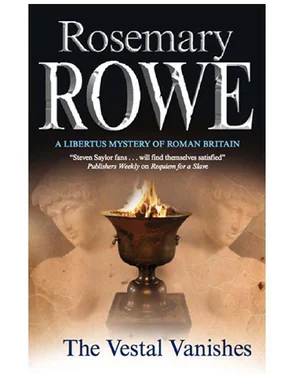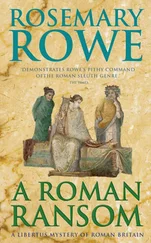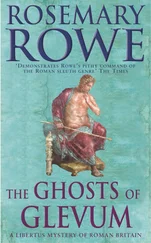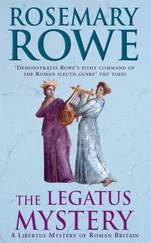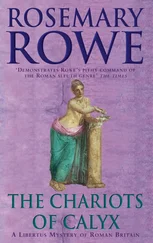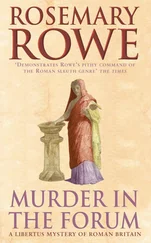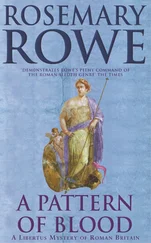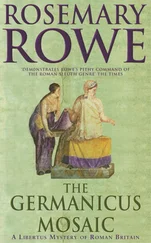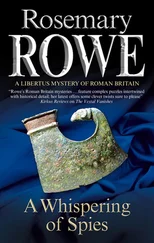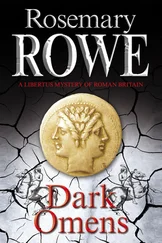Rosemary Rowe - The vestal vanishes
Здесь есть возможность читать онлайн «Rosemary Rowe - The vestal vanishes» весь текст электронной книги совершенно бесплатно (целиком полную версию без сокращений). В некоторых случаях можно слушать аудио, скачать через торрент в формате fb2 и присутствует краткое содержание. Жанр: Исторический детектив, на английском языке. Описание произведения, (предисловие) а так же отзывы посетителей доступны на портале библиотеки ЛибКат.
- Название:The vestal vanishes
- Автор:
- Жанр:
- Год:неизвестен
- ISBN:нет данных
- Рейтинг книги:3 / 5. Голосов: 1
-
Избранное:Добавить в избранное
- Отзывы:
-
Ваша оценка:
- 60
- 1
- 2
- 3
- 4
- 5
The vestal vanishes: краткое содержание, описание и аннотация
Предлагаем к чтению аннотацию, описание, краткое содержание или предисловие (зависит от того, что написал сам автор книги «The vestal vanishes»). Если вы не нашли необходимую информацию о книге — напишите в комментариях, мы постараемся отыскать её.
The vestal vanishes — читать онлайн бесплатно полную книгу (весь текст) целиком
Ниже представлен текст книги, разбитый по страницам. Система сохранения места последней прочитанной страницы, позволяет с удобством читать онлайн бесплатно книгу «The vestal vanishes», без необходимости каждый раз заново искать на чём Вы остановились. Поставьте закладку, и сможете в любой момент перейти на страницу, на которой закончили чтение.
Интервал:
Закладка:
She looked embarrassed but said steadily, ‘That is effectively the case.’
‘But why? Surely the Vestal Virgin’s life would have been excellent? It would have removed her from Lavinius’s power: she would have been cared for all her life and indeed, retired with a pension and a dowry to her name. Why would Cyra interfere with that? Wouldn’t any mother want that for her child?’
Secunda dropped her eyes. ‘Not every mother’s child would qualify.’
I stared at her. What did she mean by that? But Secunda merely fiddled with her stola-folds and said nothing further. I searched my brain. Cyra had explained the criteria to me: two living parents, both of patrician birth and physical and mental perfection of all kinds — all of which Lavinia had been judged to have, as well as a useful dowry which had avoided the entrance lottery. So what was I missing? Then I recalled Secunda’s words when I mentioned Lavinia’s mother. ‘If you are referring to Cyra…’ she had said. Was it possible?
‘Cyra was not Lavinia’s mother after all? Or was Lavinius not her father?’
She raised her eyes and smiled. ‘Neither of those things. Poor Cyra’s infant turned out to be a son — and boy-children in our family never seem to live. My father and my grandfather were both of them convinced that it was some sort of curse on us, and that it could only be removed by offering the girls to be Vestal Virgins, if they qualified.’
‘As you did not,’ I countered, but she did not rise to that.
‘As Cyra didn’t, citizen. And when she gave birth to yet another son, and it began to show the signs that all the others had — swelling up and screaming when he got a bruise, or if they got the slightest cut they almost bled to death — she knew at once that it would not survive. And what’s more, that since she’d failed again, she was likely to be instantly divorced and thrown onto the mercy of her distant relatives. Not a pleasant prospect when you’re no longer young — and she had very little money of her own, scarcely a dowry that was worthy of the name. So she found a stratagem. Lavinius of course had not been near her since the birth, so when the child was brought to him for him to pick it up — and thereby officially accept it as his own…’
‘She substituted someone else’s child?’ I finished. And then: ‘It was the nurse’s? Of course — the hair was red!’
‘Naturally, citizen? Who else could it have been? The wet nurse who was acting as attendant at the birth had very recently had a child herself — I think it was arranged between them in advance. If Cyra’s child had been a living girl, then well and good, it would be presented to Lavinius and all would be exactly as it appeared to be…’
‘If, however, it proved to be a son and sickly — as it was very like to be — then the promised substitution would be made? Especially since you tell me that he actually died. But why would the nursemaid agree to such a thing?’
‘Cyra had promised her a comfortable home and her infant the best upbringing that money could provide — and since the woman was a widow with no money of her own, naturally it seemed a wonderful exchange. What was there for her precious child otherwise? This way she would even have the chance to tend the child and watch it all its life…’
‘Until Lavinius decided that his daughter should join the Vestal house?’ I said.
‘Exactly, citizen. You can imagine what a turmoil that decision caused. You know how strict the rules for choosing Vestals are — and what the consequence would be if anyone infringed them knowingly. The omens would be simply terrible. And whatever Lavinius might or might not know, one cannot keep this kind of secret from the gods.’
I looked at her but she was clearly not in jest. ‘You believe in such a curse?’
‘Remember, citizen, our family history — the boy-children who always die in agony. What else is it but a kind of punishment? My grandfather was right. To defy the goddess by offering a girl who did not begin to meet the foremost rule was almost begging for a further curse. The nurse was terrified and Cyra even more, because she feared that if Lavinia was sent off to the shrine the slave would tell her master and the truth would be revealed. After all the child had the colouring of a Silurian slave, rather than a patrician Roman family, though it seems that Lavinius never thought to question that. So between them, they got in touch with me — Cyra writes a good deal better than her husband knows and always managed to find a public courier in town who would deliver her messages to me — and we hatched this little-’
Whatever she was going to say, the words died on her lips as Muta came stumbling frantically from the inner room, making painful strangled noises in her throat. She grasped her mistress by the stola and tugged at her, in a way that no normal household slave would ever dare to do. It was evident that she wanted her to come, and urgently.
‘What is it, Muta?’ Secunda was already following, and — since there was clearly some emergency — I came along as well, through a little anteroom, which led out to the rear and where querns and bowls and sweeping-brooms were stored, into a little sleeping room beyond.
It was a small room by any standards and it seemed smaller still for the Roman bed in it: a simple wooden bed-frame with a palliasse, not unlike the one in which I had spent the night before. Beside it on the floor was another smaller mattress, clearly made of straw, where I imagined Muta slept herself. On it sat Paulina, happily engaged in drawing patterns on her piece of slate and not even glancing up as we approached. It all seemed very tranquil but Muta was clearly very agitated still.
‘What is it, Muta?’ Secunda said again.
The slave-woman pointed to the window-space. The shutter, if there was one, had not been put in place and the room looked out onto the grounds. I went across to see. To one side was the gate, and on the other the pasture-field and the wood beyond. Nothing was moving out there except a tranquil cow. I shook my head. I didn’t understand.
Muta held one hand out at the level of her waist and made a motion as if running on the spot. We frowned at her, and then understood her at the same instant. I cried out, ‘Lavinia! She should have been in here. What has happened to her?’ just as Secunda said, ‘She must have recognized that slave-girl from the gig and taken fright.’
More pointing at the window.
‘She ran away through there?’
Emphatic nodding.
Secunda looked at me. ‘We shall have to find her, citizen — whether those slaves from Glevum learn of it or not. If she gets in the forest, the gods know how she’ll fare. She’s not used to walking anywhere alone and there are bears and wolves about. And Paulinus has just gone out to feed the beasts, he isn’t here to help. Oh, Vesta and all the household gods preserve the girl! We cannot even be sure which way she might have gone. Did you see her, Muta?’
Muta shook her head. She pointed from herself to the intervening room and made a motion as of sweeping up. I had noticed that there was a bundle of tied brooms in there.
Secunda looked frantic. It was the first time I had seen her other than serene. ‘Then it must have been the window. I don’t know where to start. If only Paulina could tell us what she knows.’
Muta squatted down beside the deaf girl, leaning very close. She pointed to her eyes and then the window-space and made that running motion that she’d made before. Paulina beamed. She took the slate and smudged it with her sleeve, half erasing what she’d drawn on it. She took the chalk and started drawing something else.
‘It’s no good,’ Secunda said. ‘She doesn’t understand…’
Читать дальшеИнтервал:
Закладка:
Похожие книги на «The vestal vanishes»
Представляем Вашему вниманию похожие книги на «The vestal vanishes» списком для выбора. Мы отобрали схожую по названию и смыслу литературу в надежде предоставить читателям больше вариантов отыскать новые, интересные, ещё непрочитанные произведения.
Обсуждение, отзывы о книге «The vestal vanishes» и просто собственные мнения читателей. Оставьте ваши комментарии, напишите, что Вы думаете о произведении, его смысле или главных героях. Укажите что конкретно понравилось, а что нет, и почему Вы так считаете.
